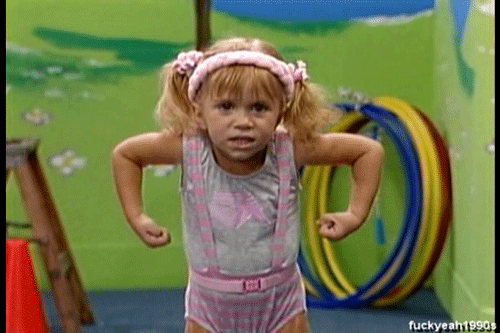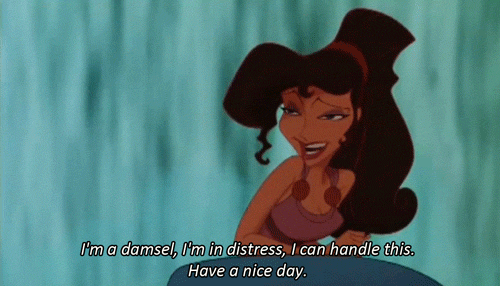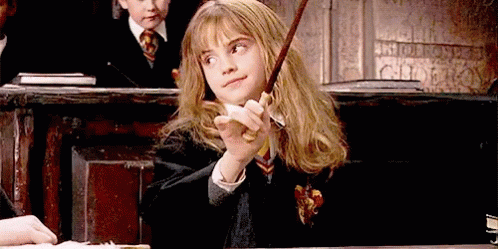Trope Breakers #14 | A Pen & Sword Article

Hello! Today I'm here to talk about a relatively new trope, but one that's garnered a lot of negative attention since it's conception: the strong female character.

We've already dealt with the eighteen-year-old powerhouse and the Mary Sue. The powerhouse is a young person (not necessarily a woman, but is often used with female characters). The Mary Sue is a character who takes over the plot--everyone and everything in the story revolves around her, even when it doesn't make sense. The strong female character trope has elements of both of these tropes in it, but there's also a lot that's different.
This trope game about in the mid 2000s. Clary Fray from The Mortal Instruments and Katniss Everdeen from The Hunger Games really started the trend of strong female protagonists. Prior to those two books being released, most books had male protagonists. If a book was narrated by a woman, the woman usually was not a fighter. After those two books--particularly the Hunger Games--were successful, many books, movies, and television shows followed their example.
Since then, we received the Lunar Chronicles, Throne of Glass, Divergent, the Grisha Verse, Star Wars: The Force Awakens, Red Queen, Daughter of Smoke and Bone, and many, many other media, all with powerful female protagonists. Even ongoing series, such as Rick Riordan's books, began to focus more heavily on their female characters. Now, if you pick up a book, watch a movie, or watch a TV show, almost everything has a woman as a main character. Most often, she is capable of handling herself, or at least, she appears that way. They are sarcastic, can fight, and usually have some sort of special ability.
So, why does this irritate so many people? Shouldn't it be a good thing that women are getting so much representation? Well, it would be, if not for the way this trope is often written. Prior to The Hunger Games, female characters were allowed to be emotionally strong or intelligent rather than a capable fighter. Most female characters today do not show their emotions. Their only value is in their ability to defeat their opponents. They take on men much bigger and/or more powerful than them and are complimented in the story frequently by the other characters (often male) for their combat skills. In Throne of Glass, Celaena Sardothian spends a great deal of the story bragging about and being told that she is an amazing fighter. Celaena is cold, brutal, and often shallow; physically strong, but weak in characterization. This is what people criticize when they speak of strong female characters: emotionally stunted powerhouses who put men in their place and take down the bad guys. Honestly, many of these characters seem interchangeable with men, or are perceived as dull Mary Sues.

Writing this type of character isn't bad; it can even be fun for writers and readers. Despite my serious problems with her character, I really enjoyed reading about Celaena. If you want to design a powerful character who feels real and has depth, here are some tips.
One method would be to let them be vulnerable. I'm not talking about a damsel in distress--I think those are still forbidden. I'm talking about letting your female characters feel the weight of what they're going through. Did their evil parent betray them and jumpstart the apocalypse, let that sink in. Let your main character question themselves, or worry about whether they can take down their own parent. Their home is destroyed, their sibling kidnapped, no matter what we need to see something from them. Your character needs to feel things, and not just anger. Anger has become author shorthand for "See! My character has emotions! They're not cardboard!" Don't just make them angry all the time. Let them be sad, happy, distraught, confused, miffed, heartbroken, delighted, skeptical. We're inside their head. We should be able to connect with and empathize with them. Katniss is allowed to become depressed. Buffy Summers shows empathy, joy, sadness, disappointment, and so much more. The female characters in A Song of Ice and Fire display a large range of emotions. Therefore, all of these characters feel real. They aren't just fighting machines. Taking away a female character's emotion implies that women can only be strong if they create an emotional wall and prioritize fighting above all else. Of course, they're allowed to fall head over heels for the first hot guy they see and make him their entire reason for living, because somehow that isn't seen as weak.

Another way to make a strong female character feel more realistic is to let her fail every so often. Let her be wrong. This goes with the Mary Sue idea as well, but think about how often female characters nowadays deal with tragedy or real failure. In fact, few characters deal with it at all, regardless of their gender. There are contrived instances were we are supposed to feel like they lost something or they messed up, but it feels so fake. Clary Fray, Rey, and Calaena Sardothian never suffer anything devastating, nothing like what Katniss, Arya, Buffy, and Daenerys go through. The strong female characters this trope represents rarely mess up or lose. Rey wins in The Force Awakens and The Last Jedi. There is no tension for the last movie. I don't doubt that she will defeat the First Order effortlessly. The only way Rey won't emerge victorious is if they give Kylo Ren the real victory by having him switch sides or by going with a Fallen Hero story and having Rey give in to the dark side. This only further separates the reader from the story and the character. The villain doesn't have to win, but someone in the book has to be able to put the main character in peril. There have to be stakes and consequences for their decision. Now, for the letting her be wrong part, it's much more straight forward. Don't make her always right.
No character should be right all the time. It's part of the reason Hermione Granger annoys me in the movies and books four through seven. Hermione is rarely wrong, but when she is she never apologizes or even admits it. She does many things that, had a male character done them, they would have been criticized. Instead, Hermione isn't punished and doesn't suffer for her actions. If your character does something bad, they need to pay for it. If your character is wrong about something, the narrative needs to draw attention to it. Otherwise, readers will feel that the character is too perfect (think again of Mary Sue) or that their actions are glossed over because they're the main character. This tends to send the message that woman are only strong if they're perfect, because people are actually capable of being perfect, apparently.

Lastly, if it's not necessary for plot, don't make them a total powerhouse. Lots of female protagonists are given special powers, a leadership role, a reputation for being awesome, and are nigh unbeatable in a fight. They don't have to rely on ingenuity, intelligence, their friends, or sometimes even their own skills. Sometimes they are a great fighter but don't have powers (think Katniss) or sometimes they have powers but not fighting skills (think Cinder and Manon Barebone). This implies women can only be strong if they're magic, an incredible warrior, or both. It also denies anatomy, as most teenage girls could not overpower full-grown men. Instead, make your female characters intelligent. She doesn't have to be an inventor or a genius like Violet Baudelaire, but it is really refreshing to see characters of any gender relying on intellect. Your character could still have powers or be a good fighter; just don't make her amazing and unbeatable. You could also make her creative or let her find other methods to achieve her goal. Warrior isn't shorthand for strong.
I think to most important thing for writers to grasp is that you have to make the character feel real. It doesn't matter how awesome your character is. Even with male characters, you can't just rely on their powers. You can't just have them a blank canvas or a ball of anger. It also isn't good to keep them in this bubble of perfection. People mess up. If you want to be inspiring, show normal characters who rise to the occasion. Let them learn from their mistakes. Note that this requires they actually make mistakes. They need to be a well-written character first. I feel like many writers start out with this goal that their protagonist will be a strong female character rather than letting her evolve into one as the story progresses. So, before you write a female character, think about who they are. Their personality and characterization should be developed more than and before their powers.
Of course, you could also just disregard this article entirely and write any character you want. *Shrugs indifferently* It is your story.

Illeandir asked: How do you choose where and with whom to begin your story?
This may be a given, but I recommend starting with the main character. This is simply because it's by far the norm, and readers will expect that the first person they get inside the head of, or even the first person the action centers upon, is the one that they are supposed to be rooting for. If you have several main characters, then it's largely up to you. Guidelines suggested are to a) use whichever one is most conducive to plot advancement (readers want to see action happen), or b) whichever one is most likely to hook and connect with your audience. Adding secondary characters into your opening scene is great, too, as it provides depth and a background to your character's existence. In that opening scene, though, every sentence and supplementing individual should strive to advance the reader's understanding of your protagonist.
As for where, my advice is to match the opening setting to your opening character. Not the environment where he's most "comfortable", necessarily, but one that reveals him best. Jumping into a high-intensity fighting scene might work best on one character. For another personality, the same type of scene might fail develop the reader-character relationship at all, and a better match would be a domestic scene, or the grocery store, or at work.
Know your characters. Know what makes them tick. Once you know that, you can handle anything -- even those finicky story starts.
Thanks for the question! If any of you lovely readers have something to ask, comment and let us know. We do our very best to answer!

Perfection by merphynaper
The Last Dance by CelticWarriorQueen17
The Scarlet Mirror by PennyWithaney
The Initiative by DumDumPops4
Empty Chains by StormRidden

Is your fantasy kingdom/world known for any special foods? Is there a food staple in the country? (example: the state of Georgia is known for their peaches, etc)
How do you feel about love triangles? How about other tropes and cliches--- what are your favorites and least favorites? Any discussed in "Trope Breakers" you like/don't like? How often do you use tropes and cliches and do you like them in books?
Do you think stories are more effective if its characters are more likable, or more flawed and unlikeable?
Any newly released books you're excited for? And while we're talking about released books (non wattpad books too), what book within the past few decades have had the best message/meaning? Which one hits home for you?
What are your writing goals? Did you set any last month when 2019 started, and if so have you followed through?
Bạn đang đọc truyện trên: Truyen2U.Com